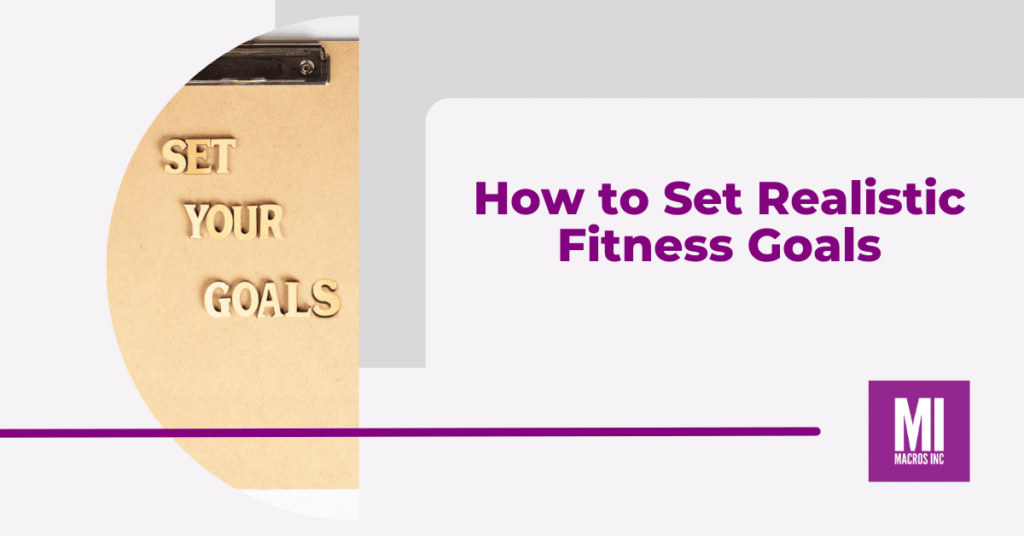When the bell strikes midnight on December 31st, our thoughts often turn to New Years Resolutions and we echo the promise of “New Year, New Me”. We set goals of running marathons, working out 7 days a week and losing 20lbs. We’re going to cut out sugar, stop eating carbs and only eat kale for the whole of January. We might even add a cleanse or detox into that mix, but here’s why those goals are doomed to fail faster than your finger clicking “add to cart” when Lululemon has a sale.
Starting a new fitness journey can feel exciting and daunting in equal measure, and there’s something about the New Year that makes us push our goals to the extreme. Promising ourselves this year will be the year we achieve it all. And, it can be. But only when we approach these goals with the right mindset.
With a plethora of fitness goals, examples and ideals floating around, it’s crucial to set realistic goals that align with your lifestyle and health.
Jump to a Topic
So, How Do You Set a Realistic Fitness Goal?
Running a marathon absolutely may be in the realms of possibility for you, but if your current running experience is limited to a frantic dash around the grocery store when you’ve forgotten that one crucial item, then setting your sights on a more realistic goal of running 10k will help make this more achievable (and enjoyable for you).
Firstly, be honest about your starting point. If you can’t remember the last time you set foot in the gym, your diet consists of the kids leftovers, and trying to find 5 minutes peace is a struggle in your schedule then you need goals that align with your reality.
Setting unrealistic goals can leave you feeling like a failure, disappointed and burnt out. On the other hand, realistic goals will keep you motivated and on track. Make your goals SMART and before you know it, you’ll be reveling in your success.
How to set goals, the SMART way:
S – Specific – Be specific when setting your goal. Don’t use a vague notion such as “Get fitter” but instead make this a clear goal “I want to be able to run for 15 minutes without stopping”
M – Measurable – Can you easily measure your goal and progress? In the example above progress can be measured by how long you can run without stopping.
A – Achievable – Is your goal achievable within it’s time frame? E.g is it realistic to expect that you will be able to run 15 minutes non stop in the next 3 months?
R – Relevant – Your goal should be relevant to your longer term goals. What is the purpose of being able to run without stopping? Is it a stepping stone to a bigger goal of running a marathon?
T – Time-based – Setting a realistic but ambitious end date helps to increase your motivation, and also allows you to gauge progress.
With that in mind, here’s some examples of health and fitness goals that are realistic.
“Make sure whatever you choose to do – you enjoy it. You are much more likely to stick with what you enjoy, than force yourself to do something you think you need to do. Something is always better than nothing.”
Braden Ripley, CPT, B.Sc. Exercise and Sports Studies.
Lead Coach at Macros Inc
Examples of Realistic Fitness Goals
Run a 5k in Six Months: This is a great goal if you are new to running, it will help improve your endurance and stamina.
Attend a workout class once a week: If you’ve got a set time in your schedule for working out this will help you stick to it and build a routine.
Complete a full body workout once a week: A great goal which can be achieved at home or the gym.
Crafting a Fitness Goal Specific to You
Fitness goals need to be personal to you, here’s a few tips to help get you started.
Assess your current fitness level: Understanding your starting point will help you set achievable and realistic goals.
Set short-term and long-term goals: Short-term goals give you quick wins and act as stepping stones towards your long-term goal, helping you remain focussed on the bigger picture.
Get professional help: A trained professional can help you in many ways. From keeping you accountable to offering personalized advice and helping you avoid injury.
Eat one portion of fruit or veg with every meal: We all need to eat more fruit and veg so making a conscious effort to add an extra portion to your meal is a great goal to set, your body will thank you for it!
Set a sleep goal: Health and fitness isn’t all about getting stronger or faster, it’s also about rest and recuperation. Setting a goal of sleeping a certain amount of hours, or even a set wakeup or bedtime can have a huge positive impact on your overall well being.
Wrap Up
Remember whatever fitness goal you decide upon, make sure they align with your lifestyle and overall goals for the year. Fitness goals should be sustainable not extreme.
When it comes to balancing your aspirations and your health, realistic body goals are not just about aesthetics; they’re about your overall health and wellbeing. Focus on what feels good, and more importantly what is sustainable. Remember true progress takes time, and every small step counts.
By being SMART with your fitness goals and adding a good pinch of patience your can achieve your goals, and maintain a healthy, active lifestyle. Afterall, the journey is just as important as the destination.
Try our nutrition coaching, for free!
Be the next success story. Over 30,000 have trusted Macros Inc to transform their health.
Simply fill out the form below to start your 14-day risk-free journey. Let's achieve your goals together!

